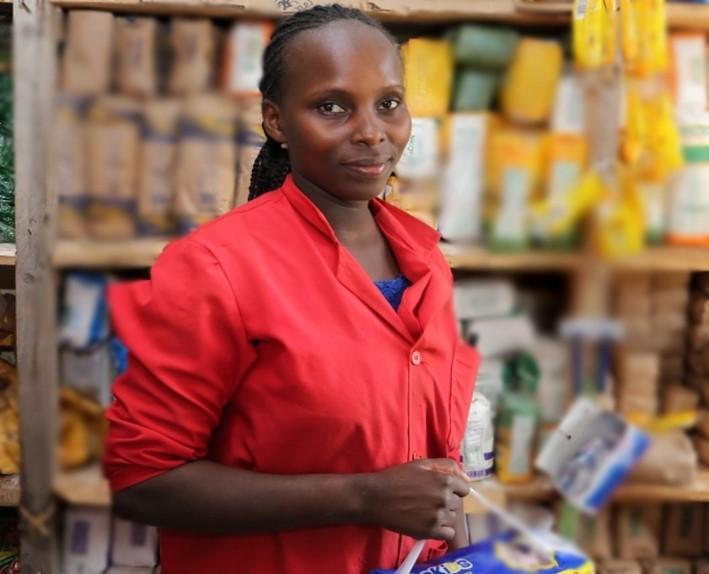A Roadmap to Grow the Developing World’s Mom-and-Pop Shops
By Juan Carlos Thomas, Global Entrepreneurship Director & Alice Waweru, Entrepreneurship Portfolio Lead
Nancy Wambui started the Lucky Genesis Shop—a neighborhood store selling eggs, tomatoes, milk, and snacks outside Nairobi, Kenya—with the goal of providing a better life for her son and younger siblings. But Nancy struggled to run the store effectively, and with sales of just $50 per day, she couldn’t ensure a stable livelihood for her family. “After separating from my husband, I went through a very difficult moment in my life,” she says. “I could not afford a place to stay, and I lived in the shop, which had little room for me and my son.”
Microretailers like Nancy are vital to local economies across Africa, Asia, and Latin America, providing vital goods and services to base-of-the-pyramid consumers who are not served by larger retailers. In Nairobi, such dukas sell more than 80 percent of the consumer goods in the city. These shops also serve as an important source of employment and income for low-income families.
But as important as these shops are, they face a number of challenges that limit their growth and ability to generate economic opportunities. At TechnoServe, we’ve worked with more than 8,000 shopkeepers across half a dozen countries, and we have identified a few key capabilities that microretailers need to set their stores on a path for growth, holding true across geographies and sectors. In developing a roadmap for microretailers, we identified four key capabilities that all shopkeepers need.
1. RECORDKEEPING AND FINANCIAL MANAGEMENT
The first step in micro retailer training often involves helping microretailers understand their financial situation through basic recordkeeping. Retailers tend to keep informal or incomplete records and frequently mix their personal and business finances, which makes it difficult for them to understand the performance of their shop. In Nairobi, for example, we found that half of microretailers kept no records at all, while the other half kept incomplete and scanty records. With better information, however, shopkeepers can make better decisions about product lines, pricing, saving for growth, and other factors.
2. INVENTORY MANAGEMENT
To be profitable, stores need to ensure that they don’t run out of key products — but also avoid having capital locked up in inventory that doesn’t sell. In some Kenyan shops we worked with, for instance, half of the store’s investment was found in products that sat on the shelves for more than six months; this capital could instead be invested in more profitable products.That’s why we help microretailers learn how to analyze their sales data and the market so that they stock the assortment and quantity of products that maximize their profits.
3. MERCHANDISING
The best inventory in the world won’t matter if a customer can’t find it. Retail merchandising is one of those things that can make or break the success of the store. Poor layout and atmosphere can discourage easy shopping, leading consumers to take their business elsewhere or reduce their purchase. When implemented correctly, on the other hand, visual merchandising--such as grouping similar types of products together or giving special prominence to specific items--can lead customers to the right products and entice them to buy more.
4. CUSTOMER SERVICE AND PROMOTION
Understanding how to attract potential customers and keep them coming back are important skills that can increase the sales and profitability of a business. However, shopkeepers don’t always approach the question of how to do this in an analytical manner. Microretailers can gain greater profits if they build upon the promotion strategies offered by the brands they carry and apply their own unique knowledge of their own community, customers, and store. For example, microretailers can offer unique “hook” products that bring customers into their stores; we worked with an entrepreneur in Chile whose shop was located near a taxi depot, and he had great success attracting a clientele of taxi drivers by offering ready-made sandwiches.
Taken together, these four capabilities can help to transform a shop. Ultimately, Nancy Wambui enrolled in the Smart Duka program, a partnership between Moody’s and TechnoServe that is helping 1,000 Kenyan shopkeepers to improve their operations. For Nancy, it was especially helpful to learn about recordkeeping and merchandising. “Before Smart Duka, my products were all over the place,” she explained. “My display window was so crowded I had to peep through products to talk to customers, meaning they couldn’t see what else they could purchase. Now I have more customers and I keep records of my stock.”
Daily revenue at the store has grown six-fold to $300, providing Nancy with a more stable livelihood and allowing her to send her son to a better school. It’s not unusual for shopkeepers to see income increases after participating in the program: the average graduate improves her income by 30 percent within a year. This points to the ways in which these capabilities, combined with a functioning entrepreneurial ecosystem and access to finance, can help to transform shops and communities throughout the developing world.
To read The Microretailers' Roadmap: Four Capabilities All Shop Owners Need to Transform Their Businesses...and the Developing World, click here.
